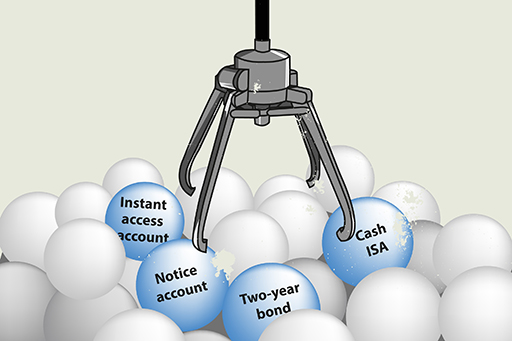9 Why different interest rates?
As you’ll have realised, the many types of savings account from banks and building societies offer a mix of interest rates.
Activity 2 Reasons for difference
Why do interest rates vary from one account to another? See if you can work out the reasoning from this table of savings accounts.
| Account type | Interest tier | Gross interest (AER) (%) |
Internet Savings An instant access online savings account |
£1–£1000 £1000–£100,000 |
2.5% 2.6% |
Instant Access An instant access telephone savings account |
£1+ | 2.4% |
Instant Access Cash ISA A tax-free instant access account with cash card Maximum saving £20,000 per year |
£100+ | 2.5% |
Lifetime ISA Maximum saving £4000 per year |
£1+ | 2.6% |
Notice Account A 120-day notice account |
£1000 –£100,000 | 2.8% |
| 2-Year Fixed Rate Bond | £100–£10,000 | 4.2% |
5-Year Fixed Rate Bond Interest paid annually |
£100–£10,000 | 5.5% |
Feedback
- You normally get a higher rate if you tie your money up for longer. So the rates on the 2-year and 5-year bonds are higher than on the other products.
- With a notice account you have to let the bank or building society know in advance (for example 90 days or 180 days in advance) if you want to withdraw savings without paying a fee.
- You normally get a higher rate on a ‘notice’ account than an ‘instant access’ account. This is because you’re giving up the ability to withdraw money immediately without paying a fee for breaching the notice period.
- The rates paid on internet savings accounts are often very slightly higher than non-internet accounts because savers themselves manage the account. This reduces the costs to the bank or building society in terms of issuing a passbook or requiring branch availability to make transactions.
- The amount saved may influence the rate paid, with higher rates paid on higher balances.
So, on the basis of this information, what would be the right savings account (or accounts) for you?
Keep your eyes on the rates being offered from different savings, and be prepared to switch accounts when a better deal is on offer.

